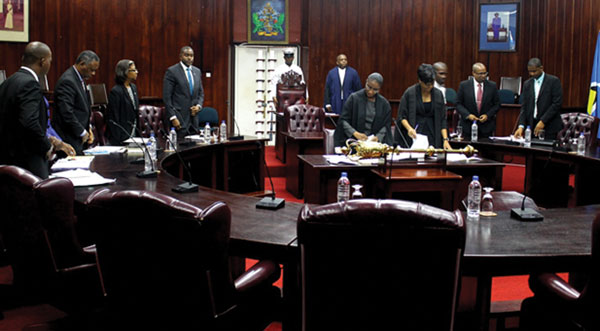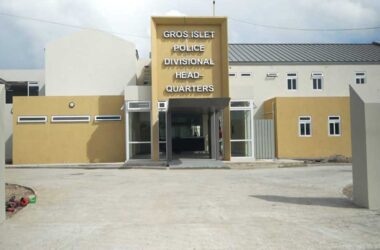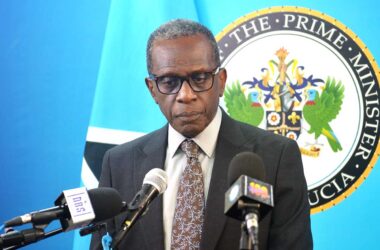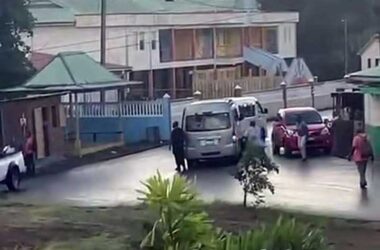IT was more or less the usual when the elected parliamentarians met Wednesday and Thursday to debate the Estimates of Expenditure, the two sides merely endorsing the views of their respective leaders.
The Prime Minister, as per usual, presented arguments to prove that despite lows in several areas, his team’s stewardship for the 2017/2018 fiscal year — which incidentally has a few days left – was credible and laced with sound economic leadership, while the Opposition Leader, as customary, did not fail to show the economy in a deteriorating state, unmanageable by the Prime Minister and his team.
The two leaders, of course, came loaded for war, armed with what each believed to be ample evidence to support their not-so-humble views.
How many St. Lucians came away factually educated about the state of the economy may be hard to determine, as thick slices of politics offered to prop-up their respective arguments were frequently served by the two leaders.
For instance, during Prime Minister Allen Chastanet’s tabling of the Estimates Wednesday, he flashed back to the fiscal performance of the 2017/2018 budget, saying he was “pleased to report to this honourable house that central government is now projecting a marked improvement in its fiscal position, compared to the target set in the approved budget.” As a result, he said, a primary surplus of $45.6 million — the equivalent of 1.0 percent of GDP and an overall deficit of $116.8 million or 2.5 percent of GDP — is anticipated relative to a primary deficit of 1.1 percent of GDP and an overall deficit of 4.7 percent programmed for the year.”
The Prime Minister went on to say that expenditure on Wages & Salaries for fiscal year 2017/18 is expected to fall short of the approved budget as a result of the non-recruitment of staff in a number of departments, in-keeping with the Government’s policy to contain expenditure through the rationalization of new hiring.
He claimed that based on the current trend, the out-turn for this category of expenditure is projected at $480 million, which translates to a 2.1 percent shortfall when compared to the approved estimates for the current year, adding that the Department of Health is the only department which is projected to exceed its budget for wages and salaries by 6%.
With regards to debt service payments, Chastanet said interest payments for 2017-18 are expected to register a marginal increase of approximately 2 percent compared to the outturn for the last fiscal year. Interest payments are projected to be $7.7 million or 4.5% below the approved estimates for the current year.
He said capital spending is forecast to reach $236.4 million by the end of the fiscal year 2017-18, which is about $16.6 million higher than in 2016/17, but still lower than the budgeted figure of $362.1 million.
As was the case in the fiscal year 2016-17, capital spending was adversely affected by capacity constraints, which impacted the implementation of some projects, and to a lesser extent delays in receipt of grant funds.
However, the Prime Minister told the House that on the issue of financing, he was indeed happy to report that based on the forecast deficit, the government had successfully mobilized at least 90% of the required financing, with the remainder expected before year-end.
He ended his presentation by stating that the financing needs for the fiscal year 2018-19 stood at $300.95 million, with a fiscal deficit of $163.9 million.
He said too that the performance of central government had improved over previous years.
“However, the size of the financing gap is still too large and our administration will continue to pursue economic growth, more vigorous revenue collections and prudent expenditure in order to reduce the borrowing requirement and improve the country’s economic performance,” Chastanet concluded.
But Opposition Leader Pierre, who was on his feet right after the Prime Minister took his seat, attempted to shoot down whatever air of confidence Chastanet may have left hanging in the parliamentary chamber.
He started off by warning that “St. Lucians must take heed of the Prime Minister’s ‘Ides of March’ estimates of 2018/2019 and brace themselves for a very difficult time ahead.
“The Prime Minister, much as he may want us to think otherwise, is now presiding over a government that is clueless and is on a reckless path, gambling away the limited natural and financial resources of the country.”
Pierre said the estimates presented are bitter pills, with no hope of improving the well-being of St. Lucians who “will feel the pain of the unrealistic promises of an uncaring and vindictive government that divides the people rather than unit them.”
To him, the estimates are unrealistic, reckless, uncaring, care-less and based on false projections, blind to the realities and sufferings of the people.
“These estimates confirm the continuation of alarming deficits and reducing surpluses. All the real incoming indicators are in a deteriorating situation,” Pierre said.
He went on to explain that when his team took office in 2011, it inherited a deficit of $53 million, which it was able to reduce to $10 million a year later. However, in 2015 a surplus was achieved of $45 million. In 2016, the good news continued with an $81 million surplus, which increased to $93 million in 2017, deceased to $62 million in 2018 and was also projected to decrease further to $43 million in 2019.
Stressing on decreasing surpluses as not being good for the country, Pierre then went on to give a pictorial view of recurrent revenues less recurrent expenses, noting that In 2013 the inherited deficit was $142 million, reducing to $60 million in 2014 under his team, reducing even further to $27 million in 2015. By 2016 the deficit was $37 million lowering to $32 million in 2017 and $61 million in 2018 projecting to reach $93 million in 2019 according to the financial statements.
Pointing to an increasing deficit as validating his point of “a clueless government” under Chastanet, the Leader of the Opposition said that in 2013 the primary deficit was $208 million, in 2014 it came down to $74 million and registered a surplus in 2015 of $19 million. This situation stayed healthy in 2016 with a surplus of $29 million with $85 million in 2017, $45 million in 2018 and projected to be $16 million in 2019.
Pierre quoted the Social Economic Review Report which states that despite an improvement in revenue the government’s fiscal situation is expected to deteriorate in 2018 with smaller surpluses and larger deficits.
“The Minister of Finance is not managing the fiscal health of our country wisely. There is a high dependency and a hope of some large magical project that will improve the fiscal situation in St. Lucia in 2019,” Pierre said.
At the end of it all, the Prime Minister tabled a budget of $1, 487,583,200, out of which recurrent expenditure is estimated at $1,202,955,300 and capital expenditure at $284,627,900.






![John Paul Estephane, Minister in the Ministry of Tourism and Commerce [Photo Credit: GOSL]](https://thevoiceslu.com/wp-content/uploads/2026/01/John-Paul-Estephane-380x250.jpg)

![DIPT-RESDP SAP graduating class [Photo credit : GOSL]](https://thevoiceslu.com/wp-content/uploads/2026/01/DIPT-RESDP-SAP-graduating-class-1-380x250.jpg)






